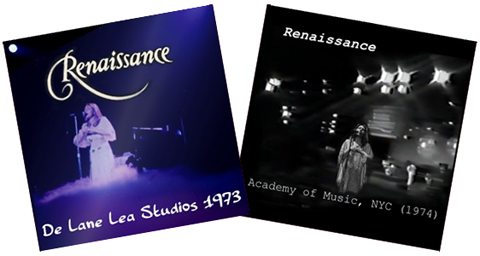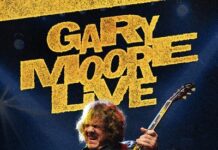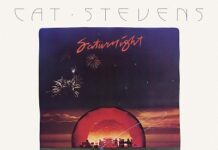De Lane Lea Studios 1973 comprises seven songs on a tour promoting the Ashes Are Burning album. According to the liner notes, the band was reluctant to tour due to gas shortages at the time. Annie Haslam said, “If we can’t get a grand piano, then it’s just not worth doing the gig.” For this gig, however, there’s a grand piano as well as a small cadre of faithful fans sitting in an intimate studio. Wishbone Ash guitarist Andy Powell plays guitar on “Ashes Are Burning,” with Al Stewart helping out on the background vocals.
A tight “Can You Understand?” truly kicks up an early revelry with heavy drumming from Sullivan and Camp’s bass up high in the mix. The middle section with Dunford’s acoustic mixing with Haslam’s vocal is just stellar. “Let It Grow” features some tickling piano. “Sounds of the Sea” is even more powerful with Tout’s expansive playing and Haslam’s lilting high range floating over the top. What a gorgeous rendition of this tune. Haslam’s voice on this performance couldn’t be better – clear as a bell and in full command of her absolutely brilliant instrument.
“Carpet Of The Sun” races a bit and Camp’s bass slightly muddies Sullivan’s percussion, but it still sounds pretty much as it does on the record, right down to those Haslam vocal trills in the chorus. “At the Harbour” opens with a Tout piano into Dunford plucking and Haslam’s vocal running round fine sea imagery of lyric. It’s very cool to hear this song live.
The regular set ends with “Ashes Are Burning” with Powell and Stewart. Renaissance clearly thrived in a more controlled studio setting than on a live stage. The bass and piano are separated for a perfect mix and Sullivan’s drums, though a bit buried, do move things along. Powell is much more restrained here, though he does bend and wail at the end. “Prologue” ends the show, as it would a year later.
Academy Of Music, NYC (1974) is taken from a live broadcast on WNEW radio in New York City and a brilliant historical document of a prog band at the height of their powers. It doesn’t quite match the sonic quality of De Lane Lea Studios 1973, but it marks the very first time an orchestra played with a rock band at this venue (according to the band’s program for the evening). Touring behind the Turn Of The Cards album, the band – John Tout on piano and keyboards, Jon Camp on bass, Michael Dunford on acoustic guitar, drummer Terence Sullivan and stunning five-octave vocals from Annie Haslam – run through nine songs on the set’s two discs.
Locking in for a blistering “Can You Understand?”, Camp and Sullivan get things started with Tout’s piano over the top and Haslam’s lush voice adding to the concoction. The Academy crowd exhibits the enthusiasm New York City audiences are known for. On this recording, we hear lots of crowd chatter and cross talk during the intros and softer passages of music.
“Carpet Of The Sun” swings with the first use of the orchestra’s strings and a solid harmony chorus. “Things I Don’t Understand,” from Turn Of The Cards, chunks along with a grooving piano, lots of sharp snare work from Sullivan, and Haslam singing over the top of it all.
She’s practically giggly as she introduces another one from Turn Of The Cards, “Running Hard.” This opens with a long piano section that flows into a full instrumental, with the raging horns of the orchestra behind them. Things get whimsical between the band and slicing strings when Haslam “do do’s” again, but mostly she goes into a lower register on the verses, to great effect, which revolve around the ever-changing landscape of life and how we are all are constantly ‘running hard’ over those changes. We even get to really hear Dunford’s solid strumming at the tail-end just before the orchestra swells around the band.
“Ashes Are Burning” is one of Renaissance’s best known songs and a regular set ender. Andy Powel rejoins the band, along promoter Howard Stein on piano. The addition of Powell is especially neat as we hardly ever hear heavy guitar played in Renaissance’s music. He certainly wails above and beyond what he did on the original “Ashes Are Burning.” Cut to “Mother Russia,” which sees the full use of the orchestra on what is probably the best song of the set. Strings, horns, and Renaissance all get down for this very long song of sweeping imagery.
Brought together, DeLane Lea Studios 1973 and Academy Of Music 1974 are incredible live examples of musical history from Renaissance, one of prog’s most diverse and challenging groups, still recording and touring to this very day.
~ Ralph Greco. Jr.




















